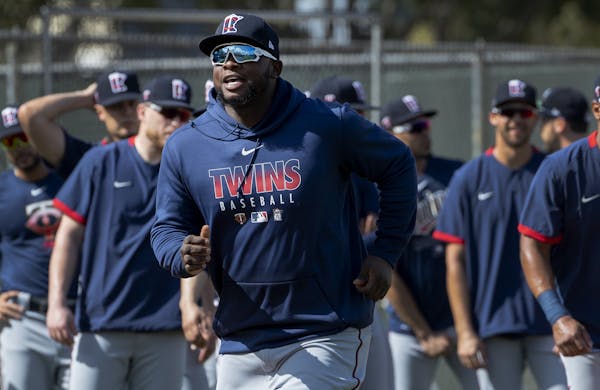FORT MYERS, Fla. – The news was bad, and the moment was fraught. Telling a baseball player he's not on the team anymore can trigger a variety of reactions, and Thad Levine remembers one such meeting, with a player he won't reveal, turning intensely emotional.
For him.
"[The player] leaned over, looked me in the eye, and said, 'It's OK — we're going to get through this,' " the Twins general manager said. "We try to always remember that these are human beings going through a negative experience. I guess sometimes I may show more emotion than the player does."
He's got a tough couple of weeks ahead. Any day now, Levine, manager Rocco Baldelli and President of Baseball Operations Derek Falvey will begin the process of winnowing the Twins' 64-man training camp team to a 26-man Opening Day roster, meaning three of every five players in camp will get tapped on the shoulder someday soon and told to walk down the narrow hallway to Baldelli's office.
"A lot of times you're expecting it. Some years, I've been like, 'What took you? I'm already packed,' " joked reliever Tyler Duffey, who has pitched for the Twins for five seasons but only once, in 2017, made the team out of spring training. "But if you're thinking you might have made it, or it's going to be close, you've probably been doing the math for weeks, figuring out who has options left and how many pitchers they're keeping, things like that. And then it hits you hard."
That's why the Twins, like many teams, try to soften the blow.
"When you have that meeting, you try to do it with the utmost diplomacy and decorum and connection with the player, because you're altering their life, and not for the positive. The minute you lose sight of that personal element, you're not doing the job as well as you should," Levine said. "Even in the best of circumstances, it's a deflating experience for the person receiving the news."
With that in mind, Falvey said, the Twins have a set of guidelines for those separation meetings. Do it in private. Let the manager, who usually has a closer relationship, speak first, and the front-office executive explain the details. Be transparent and honest, candid but not blunt, about the reasons for the decision, but offer suggestions or help. Let the players ask questions and have their say, but only if they desire. Keep the meeting short, but not abrupt. And follow up a day or two later.
"Guys don't always want to talk right away, which I respect. But I always try to text the next day and say, 'Hey, wondering how you're feeling, let me know if I can help with anything,' " said Falvey, who occasionally sat in on cut meetings while with the Indians. "One message that I learned from [Cleveland manager Terry] Francona is, 'Don't let this moment define you. It's not the final word on your career.' "
Sometimes it is, though — and that makes the process tougher. Falvey recalled having "a lump in my throat' when delivering the news, along with then-manager Paul Molitor, to veteran righthander Ryan Vogelsong in 2017.
"When you're sitting in the room with him, you know it's possible that's the last time he'll have a conversation like that. I do not take that lightly," said Falvey, adding that Vogelsong took the news very professionally. "That's a guy who's had a long career, who established himself. He's a grinder, a great teammate, a great person. That's one of the hardest parts of the job."
Most of the spring cuts, though, are simply sending players across the complex to minor league camp, and the Twins offer plenty of encouragement: Here's what you did well, and here's what you need to work on. Here's how you can get to the majors, here's where you can help.
Coaches compile a report for the minor league staff about each player's program in camp, so they can seamlessly fit in once they receive their minor league assignments.
"It's always hard giving anyone news that they don't want to hear. Nobody gets pleasure out of that. But surprisingly, you get to have a lot of positive conversations out of it, too," said Baldelli, who had never sat in on a cut meeting, other than his own as a player, until becoming Twins manager. "You try to give them good news, as good as it can be. Some advice. Try to give them a good feeling about the future."
Not every player feels good about it, however. "There's always a little tension," Duffey said, "even when you expect it. It's not a good day."
Levine said during his time as a Rangers executive, he witnessed a player grow so angry, he began shouting menacingly before stomping off. One Twins player came out of the manager's office a couple of years ago with some of the paperwork, wadded it up and threw it across the room.
"Most guys in the moment, if they're not expecting it, they're stunned," Falvey said. "Some guys ask questions, ask if they could have done something differently. If they feel like they had a good camp, they may express some frustration."
Added Levine: "They're competitors, they think highly of their talents, and they take significant issue with your decisionmaking process. It happens. I've taken the position in those instances that, that's their meeting. They need to have a forum to outlay any emotions, and I don't take it personally."






